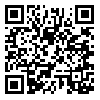Volume 13, Issue 2 (Volume 13, No 2 2022)
jdc 2022, 13(2): 102-106 |
Back to browse issues page
Download citation:
BibTeX | RIS | EndNote | Medlars | ProCite | Reference Manager | RefWorks
Send citation to:



BibTeX | RIS | EndNote | Medlars | ProCite | Reference Manager | RefWorks
Send citation to:
Eskandari S, Khamesipour A, Firooz A, Tasbihi M, Miraminmohammadi A, Tavakoli K et al . Evaluation of coronavirus infection in patients with leishmaniasis. jdc 2022; 13 (2) :102-106
URL: http://jdc.tums.ac.ir/article-1-5600-en.html
URL: http://jdc.tums.ac.ir/article-1-5600-en.html
Seyedebrahim Eskandari1 
 , Ali Khamesipour1
, Ali Khamesipour1 
 , Alireza Firooz1
, Alireza Firooz1 
 , Minoo Tasbihi *
, Minoo Tasbihi * 
 2, Akram Miraminmohammadi1
2, Akram Miraminmohammadi1 
 , Khadijeh Tavakoli1
, Khadijeh Tavakoli1 
 , Maryam Ahmadi1
, Maryam Ahmadi1 


 , Ali Khamesipour1
, Ali Khamesipour1 
 , Alireza Firooz1
, Alireza Firooz1 
 , Minoo Tasbihi *
, Minoo Tasbihi * 
 2, Akram Miraminmohammadi1
2, Akram Miraminmohammadi1 
 , Khadijeh Tavakoli1
, Khadijeh Tavakoli1 
 , Maryam Ahmadi1
, Maryam Ahmadi1 

1- Center for Research and Training in Skin Diseases and Leprosy,Tehran University of Medical Sciences, Tehran, Iran
2- Center for Research and Training in Skin Diseases and Leprosy,Tehran University of Medical Sciences, Tehran, Iran ,mtasbihi7@gmail.com
2- Center for Research and Training in Skin Diseases and Leprosy,Tehran University of Medical Sciences, Tehran, Iran ,
Abstract: (843 Views)
Background and Aim: Leishmaniasis is a parasitic disease transmitted by sandflies and is one of the endemic diseases of Iran. With the spread of the Covid-19 epidemic worldwide, the virus will interface with endemic infectious diseases in different regions. In this study, coronavirus disease was evaluated in patients with a history of leishmaniasis referred to the Center of Research and Training in Skin Diseases and Leprosy.
Methods: A total of 91 patients with a history of leishmaniasis were studied for possible SARS-CoV-2 infection. The number of patients referred to the Center of Research and Training in Skin Diseases and Leprosy during the coronavirus epidemic was also compared with the same period before the epidemic
Results: A total of 60% of patients with leishmaniasis
did not report coronavirus disease. Twenty-one percent of cases had a mild corona disease, 13% had a moderate and 3% had severe corona disease. Only a single death was reported in corona patients with a history of cutaneous leishmaniasis. The number of referrals before the beginning of the corona epidemic was twice as high as during the epidemic.
Conclusion: In these participants, mortality and side effects of COVID-19 were significantly less reported. However, further studies are needed to evaluate the immune system and cutaneous leishmaniasis protection against COVID-19. Various factors can be effective in reducing patients during the epidemic, including not going to medical centers, reducing the number of trips, and observance of health issues.
Methods: A total of 91 patients with a history of leishmaniasis were studied for possible SARS-CoV-2 infection. The number of patients referred to the Center of Research and Training in Skin Diseases and Leprosy during the coronavirus epidemic was also compared with the same period before the epidemic
Results: A total of 60% of patients with leishmaniasis
did not report coronavirus disease. Twenty-one percent of cases had a mild corona disease, 13% had a moderate and 3% had severe corona disease. Only a single death was reported in corona patients with a history of cutaneous leishmaniasis. The number of referrals before the beginning of the corona epidemic was twice as high as during the epidemic.
Conclusion: In these participants, mortality and side effects of COVID-19 were significantly less reported. However, further studies are needed to evaluate the immune system and cutaneous leishmaniasis protection against COVID-19. Various factors can be effective in reducing patients during the epidemic, including not going to medical centers, reducing the number of trips, and observance of health issues.
Type of Study: Research |
Subject:
Special
Received: 2022/09/20 | Accepted: 2022/08/6 | Published: 2022/08/6
Received: 2022/09/20 | Accepted: 2022/08/6 | Published: 2022/08/6
Send email to the article author
| Rights and permissions | |
 |
This work is licensed under a Creative Commons Attribution-NonCommercial 4.0 International License. |




